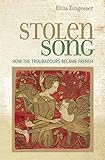Stolen Song : How the Troubadours Became French / Eliza Zingesser.
Material type: TextPublisher: Ithaca, NY : Cornell University Press, [2020]Copyright date: ©2020Description: 1 online resource (258 p.) : 10 b&w halftonesContent type:
TextPublisher: Ithaca, NY : Cornell University Press, [2020]Copyright date: ©2020Description: 1 online resource (258 p.) : 10 b&w halftonesContent type: - 9781501747571
- 9781501747649
- French literature -- To 1500 -- History and criticism
- Literature, Medieval -- Provençal influences
- Poetry, Medieval -- History and criticism
- Provençal poetry -- History and criticism
- Quotations in literature -- History and criticism
- Troubadour songs -- Influence
- Troubadours
- France
- Medieval & Renaissance Studies
- Musical Arts & Ethnomusicology
- HISTORY / Medieval
- Troubadours, medieval song, Richard de Fournival, Jean Renart, Gerbert de Montreuil
- 809.1/4 23
- PC3304 .Z55 2020eb
- online - DeGruyter
- Issued also in print.
| Item type | Current library | Call number | URL | Status | Notes | Barcode | |
|---|---|---|---|---|---|---|---|
 eBook
eBook
|
Biblioteca "Angelicum" Pont. Univ. S.Tommaso d'Aquino Nuvola online | online - DeGruyter (Browse shelf(Opens below)) | Online access | Not for loan (Accesso limitato) | Accesso per gli utenti autorizzati / Access for authorized users | (dgr)9781501747649 |
Browsing Biblioteca "Angelicum" Pont. Univ. S.Tommaso d'Aquino shelves, Shelving location: Nuvola online Close shelf browser (Hides shelf browser)

|

|

|

|

|

|

|
||
| online - DeGruyter The Basque Seroras : Local Religion, Gender, and Power in Northern Iberia, 1550-1800 / | online - DeGruyter The Frontier Effect : State Formation and Violence in Colombia / | online - DeGruyter Greek Warfare beyond the Polis : Defense, Strategy, and the Making of Ancient Federal States / | online - DeGruyter Stolen Song : How the Troubadours Became French / | online - DeGruyter Illegible : A Novel / | online - DeGruyter The House of Hemp and Butter : A History of Old Riga / | online - DeGruyter Reputation for Resolve : How Leaders Signal Determination in International Politics / |
Frontmatter -- Contents -- Illustrations -- Acknowledgments -- Abbreviations and Sigla -- Introduction -- 1. Of Birds and Madmen: Occitan Songs in French Songbooks -- 2. Keeping Up with the French: Jean Renart's Francophile Empire in the Roman de la rose -- 3. Birdsong and the Edges of the Empire: Gerbert de Montreuil's Roman de la violette -- 4. From Beak to Quill: Troubadour Lyric in Richard de Fournival's Bestiaire d'amour -- 5. The Rustic Troubadours: Occitanizing Lyrics in France -- Epilogue -- Works Cities -- Index
restricted access online access with authorization star
http://purl.org/coar/access_right/c_16ec
Stolen Song documents the act of cultural appropriation that created a founding moment for French literary history: the rescripting and domestication of troubadour song, a prestige corpus in the European sphere, as French. This book also documents the simultaneous creation of an alternative point of origin for French literary history-a body of faux-archaic Occitanizing songs.Most scholars would find the claim that troubadour poetry is the origin of French literature uncomplicated and uncontroversial. However, Stolen Song shows that the "Frenchness" of this tradition was invented, constructed, and confected by francophone medieval poets and compilers keen to devise their own literary history.Stolen Song makes a major contribution to medieval studies both by exposing this act of cultural appropriation as the origin of the French canon and by elaborating a new approach to questions of political and cultural identity. Eliza Zingesser shows that these questions, usually addressed on the level of narrative and theme, can also be fruitfully approached through formal, linguistic, and manuscript-oriented tools.
Issued also in print.
Mode of access: Internet via World Wide Web.
In English.
Description based on online resource; title from PDF title page (publisher's Web site, viewed 02. Mrz 2022)


